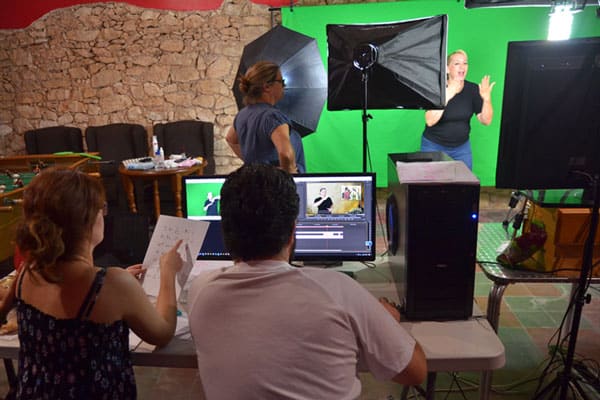Spain is a country of 47 million people at the southern tip of Europe. A little over half of the population in Spain identify as Catholic, while the majority of others consider themselves to be atheist, agnostic or hold no religious views. Evangelicals make up less than one per cent of the population. The Deaf community is among the most unreached.

Spanish Sign Language and Catalan Sign Language are the two primary languages used by the Deaf in Spain and make up the Spain Sign Language Cluster project. While most Deaf aren’t antagonistic toward Christianity, many feel it’s not relevant to their daily lives.
“It is only when one learns their language and begins to see the world through their eyes,” notes the project adviser, “that a real relationship can be built. Largely for this reason, the Deaf community is among the most unreached.”
But producing sign language Scripture in Spain has unique challenges: the team is working with two related signed languages, and in co-operation with both Protestants and Catholics. Working with people from two religious backgrounds requires flexibility.
Spain Sign Language Cluster team members recently finished drafting the entire New Testament. The team’s focus has now shifted to working with consultants to finalize the checking. Approximately 50 per cent of the New Testament has been published, and the other half will be published as the consultant-checking is completed in both Spanish and Catalan sign languages.
When the team brought drafted Scripture to the Deaf community for feedback, people expressed how important it is for them to have God’s Word to guide them. “We need to stand firm holding on to Jesus, holding on to Scripture,” a Deaf Christian signed.
The translation team members themselves are also being changed by Scripture in their language.
Sign language translation involves facial expressions, body positions and movements; Pastor David, an on-screen signer for the project’s motion capture Scripture videos, has to express emotion while recording God’s Word.
One day the team was filming the story of Lazarus’ death and resurrection from John 11. In the passage, Jesus weeps and is also deeply troubled. As David signed, he imagined the emotions Jesus must have experienced.
“Being forced to feel the text is far more impacting on my life than just reading the words,” he expressed.
Adapted from a story at wycliffe.org

